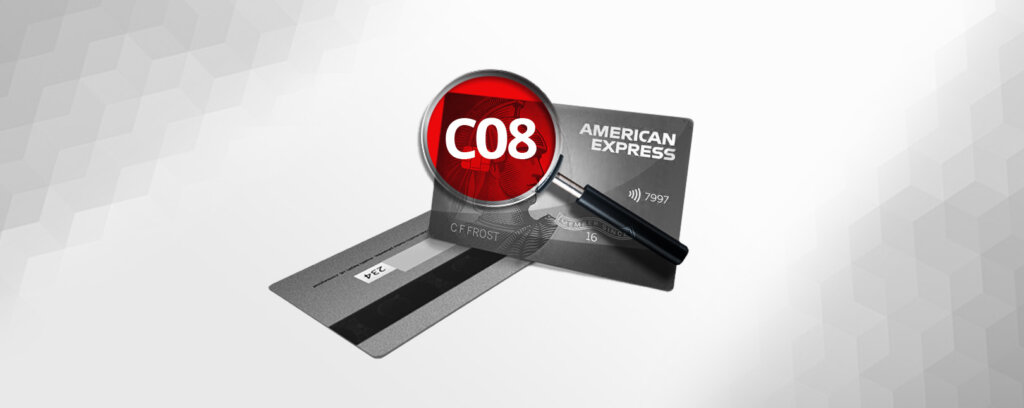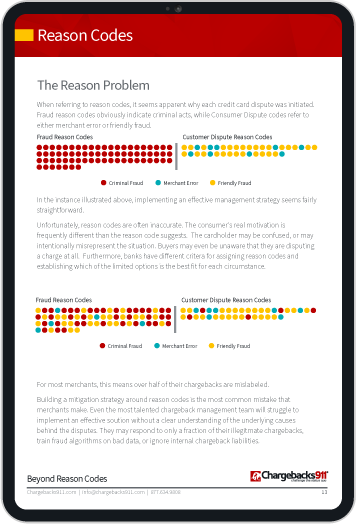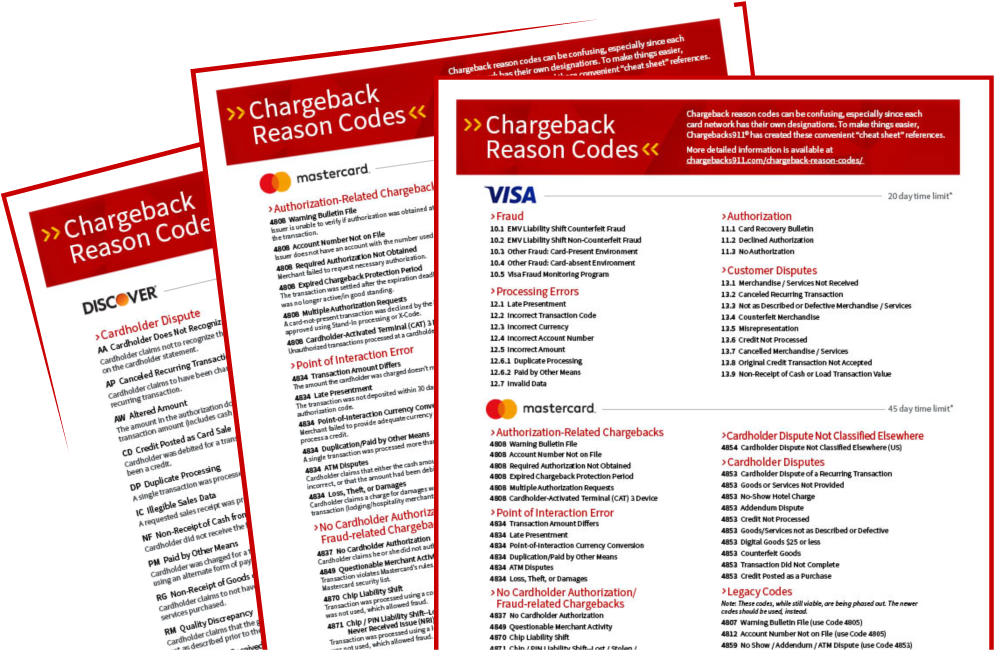
How to Handle Amex Reason Code C08 Chargebacks
American Express breaks down the acceptable causes for a customer to dispute a credit card transaction in their dispute guidelines. This is done for the sake of simplicity and standardization.
Each chargeback trigger has a designated “reason code.” Amex can then assign the appropriate code to each case to show the given reason for the chargeback.
Learn more about Amex reason codes
Today, we’re looking at one reason code in particular — C08 — and exploring the causes, timeframes, fees, and other specifics. We’ll also explore what you can do to prevent these chargebacks from happening.
Recommended reading
- PayPal Account Limitations? Here are 5 Ways to Respond.
- Best Credit Card Processing Companies of 2025 REVEALED
- What Happens When You Dispute a Transaction?
- Spring 2025 Updates to Visa’s Merchant Fee Schedule
- What is Smishing? How to Identify & Prevent SMS Text Scams
- How EMV Chip Cards Work: Pros, Cons, Data Points & More
What is American Express Reason Code C08?
American Express chargeback reason code C08 is “Goods/Services Not Received or Only Partially Received.” This reason code is used to explain that, as the title implies, the cardholder made a purchase, but claims to have not received the goods or services purchased. Either that, or the goods only arrived in a partially complete form.
To illustrate, imagine that a buyer comes to your site to purchase an item. While there, the cardholder finds several other items they like, and decides to add those onto their order before proceeding to checkout. However, when the shipment arrives, one of the items purchased is missing.
In the example outlined above, the cardholder will have received a partial shipment, with no explanation as to why one of the items is missing. In response, the cardholder calls the bank, and a reason code C08 chargeback is filed.
What Caused This Dispute?
Amex Chargeback Reason Code C08 may be issued if an Amex cardholder claims to have made a purchase, but either never received the goods, or only received some of them. To demonstrate, this scenario can arise if:
How to Respond to Amex Reason Code C08 Chargebacks
What if you're able to demonstrate that the customer actually received the products or services they were guaranteed?
If you're confronted with an Amex C08 chargeback, it's in your best interest to address the issue promptly. Feeling that the chargeback was unjustified? You can lodge a dispute response. This is achieved through a process called representment.
Representment is the process through which you’ll challenge a chargeback. You present proof to the card company, American Express in this instance, that all aspects of the purchase were legitimate and complied with the card company's regulations. Several crucial pieces of evidence may be involved in this process.
Also, it's crucial to remember that there's a strict deadline to take into account. You only have a 20-day window in which to submit your response to American Express. This time limit includes the time required for your acquirer to give you a dispute notification, and the time the acquirer takes to review and submit your case. Put simply, you're often left with only five days or less in which to prepare and submit your response.
Acceptable Evidence for Amex Reason Code C08 Responses
You can re-represent these charges under the condition that you have compelling evidence.
For American Express reason code C08 chargebacks, you’ll need to provide some (or all) of the following pieces of evidence:
- Proof of delivery. This should include the delivery date and full shipping address to which the item was delivered.
- Proof that any services purchased were provided, and the date on which these services were rendered.
- Completed work order, approved in writing by the cardholder. Must include dates on which goods or services were provided.

You can provide additional proof that the buyer received and was satisfied with the goods, too. Examples include copies of email conversations, phone transcripts, or even social proof like photos of the buyer with the goods.
Alternately, you can also provide proof that you provided a credit to the buyer to offset the cost of the transaction. This credit must have been provided before the dispute was filed.
The success of representment depends on the thoroughness and relevance of the evidence provided. Maintaining detailed records of transactions and communications with customers is vital to effectively counteract all chargebacks, including those under reason code C08.
Additional Evidence Requirements: Card-Not-Present Transactions
A card-not-present (or “CNP”) purchase is any transaction in which you do not have physical access to the payment card used to conduct the purchase.
American Express imposes additional evidence requirements for representment of CNP transactions in which the buyer picked up goods from your retail location. This could include mobile orders placed at a restaurant, or “buy online pick up in store” (or “BOPIS”) transactions.
Here, Amex requires you to provide a pickup form with a verified signature from the cardholder (or authorized third party). You must also demonstrate that the identity of the cardholder was verified at the time of pickup. For example, by providing a photocopy of the buyer’s driver’s license.
Additional Evidence Requirements: Airlines & Transportation
In addition to the pieces of evidence outlined above, American Express has additional requirements for dispute evidence that are required of airlines and transportation companies. For transactions in these verticals, you must also provide at least one of the following pieces of evidence as part of representment:
- Evidence that the cardholder (or the designated passenger) boarded the flight/voyage. Admissible documents include a scanned boarding pass or passenger manifest.
- Credits of frequent flyer miles or loyalty point program rewards for the flight or travel in question, showing a direct connection to the cardholder.
- If flight in question was scheduled during airline bankruptcy proceedings, proof that the flight in question was available during the period specified.
- Evidence of ancillary transactions related to the original transaction. Examples include seat upgrades, baggage payment or purchases made on board the craft.
- An itemized invoice for associated charges.
Additional Evidence Requirements: Digital Goods Merchants
Digital goods sellers have additional requirements for admissible evidence, too. If a buyer disputes a transaction after downloading digital goods from your site or app, or if the goods were accessed online, you must provide one of the following pieces of evidence in order to re-present the charge:
- Proof that the IP address used by the cardholder at the time of purchase matches the IP address of the point at which the digital goods were downloaded or accessed.
- Proof that the email address provided by the cardholder at the time of purchase matches the email address to which the digital goods were delivered.
- Proof that your website was accessed by the cardholder for digital goods or services after the transaction date.
In addition, you may (but are not required to) provide one of the following as supplemental evidence to help your case:
- Description of the digital goods purchased
- Date and time the digital goods were downloaded or accessed
How to Prevent Amex Reason Code C08 Chargebacks
As the old adage goes, “an ounce of prevention is worth a pound of cure.”
You may never be able to stop chargebacks entirely. But, you can limit your exposure to risk and keep your chargeback ratio in good standing by adopting a few best practices. Generally speaking, you’ll want to:
Set Reasonable Expectations
Provide realistic expectations for delivery and fulfillment windows. When providing an estimated delivery date, remember that it’s better to under-promise and overdeliver.Be Timely
Ensure that goods or services arrive by the date stated at the time of purchase as often as possible.Reach Out When Problems Arise
If a shipment is going to be late, notify the buyer immediately about the delay. This applies for incidental delays, as well as backordered or out-of-stock items. Give the buyer the option to cancel is they choose to do so.Request Proof of Delivery
Proof of delivery is recommended for high-ticket items. But, even for low-dollar value purchases, it’s still best to verify the buyer’s address when possible.Wait Until Delivery to Charge the Card
It’s a good idea to submit charges for processing only after goods or services have been delivered to the buyer. That way, you can simply cancel an order if needed.Issue Prompt Refunds
Issue a refund within 24 hours of receiving a notification that a buyer did not receive goods or services purchased.Take a Wider View
You can dispute invalid chargebacks from Amex reason code [CODE]. However, it’s much more efficient to take a proactive stance. The same is true of the other chargeback reason codes, as well. A truly effective chargeback management strategy must encompass prevention as well as disputing cases of friendly fraud.
Chargebacks911® can help your business manage all aspects of chargeback reason codes, with proprietary technologies and experience-based expertise. Contact us today for a free ROI analysis to learn how much more you could save.
FAQs
Does Amex investigate chargebacks?
Yes. American Express investigates chargebacks by reviewing the evidence provided by both the merchant and the cardholder to determine the legitimacy of the transaction and decide on the chargeback claim. This process ensures a fair resolution based on the documentation and arguments presented by both parties.
What is the reason code for a chargeback on American Express card?
An American Express chargeback reason code is a code that identifies the specific reason a cardholder or issuing bank has disputed a transaction, guiding the merchant on the nature of the dispute and what evidence may be required to contest it. Each code corresponds to a particular issue, such as unauthorized use, processing errors, or non-receipt of goods or services. Click here to see a full list of Amex reason codes.
Do police investigate chargebacks?
Police typically do not investigate chargebacks as they are considered a dispute between the merchant and the cardholder, handled through the card issuer's internal processes. However, if fraud is suspected as the cause of a chargeback, law enforcement may be involved in investigating the fraudulent activities.
How successful are Amex disputes?
The success of an American Express dispute depends on the merchant's ability to provide compelling evidence that the transaction was valid and in accordance with Amex policies. Success rates vary widely based on the nature of the dispute and the quality of the documentation provided by the merchant.
How does American Express investigate disputes?
American Express investigates disputes by reviewing documentation and evidence provided by both the cardholder and the merchant, such as transaction receipts, proof of delivery, or communication records, to determine the validity of the chargeback claim. This process aims to ensure a fair resolution based on the facts presented by both parties.











